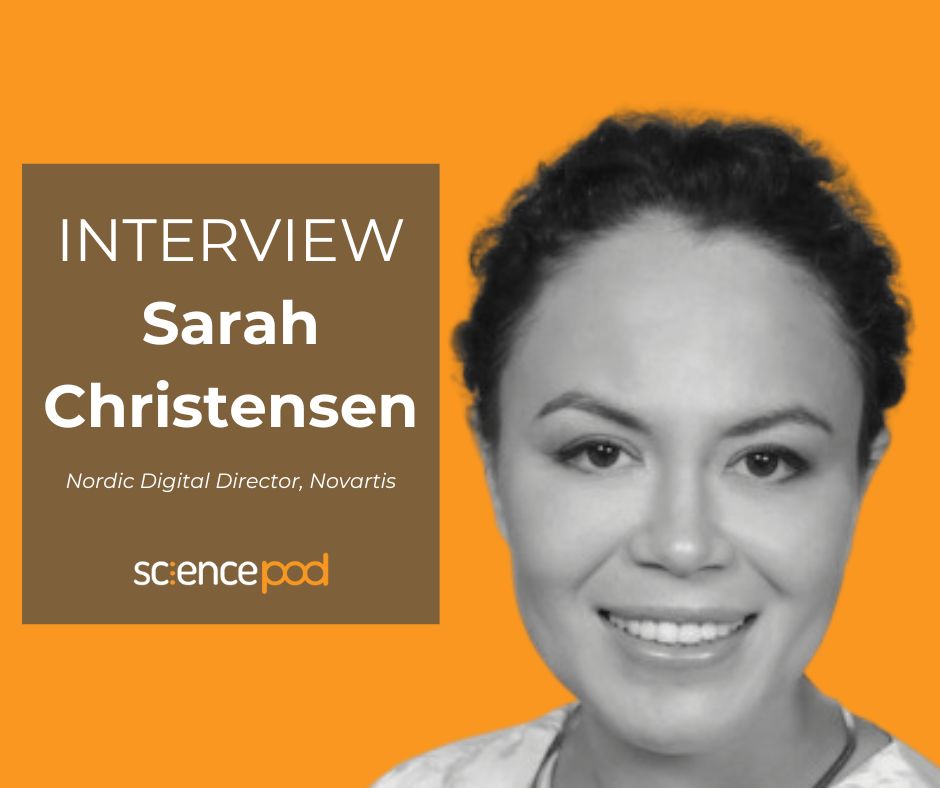Interview with Sarah Christensen, Nordic Digital Director, Novartis
Reuters Events: Pharma 2024 will run from 16-18 April 2024 at the International Barcelona Convention Center, Barcelona. The event will showcase ideas developed by a multitude of leading voices within the pharmaceutical industry as they seek to shape the future of the industry and how it engages with healthcare providers.
Sarah Christensen, Nordic Digital Director at Novartis will participate in a panel discussion entitled “Unleash next-generation customer engagement models by harnessing generative AI” on the second day of the event.
SciencePOD had the opportunity to speak with Sarah in advance of the event.
Understanding and leveraging data in order to tailor and personalise HCP communications, and harnessing adaptive solutions is important in meeting HCP expectations effectively.
Sarah Christensen Tweet
What are your biggest lessons learned in 2023 in terms of evolving HCP needs, expectations and preferences?
In 2023 our biggest lessons involved understanding and acting on evolving HCP requirements. We know HCPs have incredibly busy schedules, and require personalised and relevant information that is readily accessible, tailored to their specific practice areas, and preferably in a bite-size format. The way that we communicate with HCPs has changed since the COVID-19 pandemic. What we saw during the pandemic was an increased adoption of digital platforms making remote interactions and digital content crucial for engagement.
Henceforth, our best engagement approach in the future will be a hybrid communication model where we not only engage face-to-face but also use all the available digital channels at our disposal to ensure that we are directing the right content to the right HCP at the right time.
Understanding and leveraging data in order to tailor and personalise HCP communications, and harnessing adaptive solutions is important in meeting HCP expectations effectively.
How might AI be leveraged to align with HCP needs and deepen engagement?
AI presents an invaluable opportunity to align with HCP needs and deepen engagement. We can use AI-powered tools to achieve this in a number of ways. For instance, we can use AI in similar ways to other industries, such as the tele-communication industry, whose data platforms sit on an AI foundation if you will, drawing customer insights and making predictions from big data.
Adopting such an approach would allow us to gain real-time insights into HCP preferences and behaviours and clinical trends. This in turn would help us tailor communication strategies and content offerings to match the specific interests and requirements of individual HCPs.
Pharma could also use generative AI to create and reformat content, ultimately reducing the time it takes to produce and approve new materials. AI can also allow us to answer HCP questions in a fast but compliant way.
For example, using AI in the form of chatbots or virtual assistants that can provide immediate support to answer queries and offer personalised recommendations could be very helpful. This will not only enhance the HCP experience, but also enable a deeper, more extensive engagement with each HCP. AI has also really taken off in terms of content production – we need to add value by aligning this with HCP needs so that we aren’t just churning out generic info with this type of AI.
What is your opinion of new tech that could enhance digital engagement with HCPs?
Whilst it’s not on my radar at the moment, I am most excited about really innovative technologies such as augmented reality or virtual reality. These technologies will be very useful for immersive training experiences that allow HCPs to enhance their clinical skills and knowledge in a realistic virtual environment. I have seen examples of such technologies being used very impressively for surgical training and also for clinical image analysis to enable faster diagnosis – for example, such systems have been shown to identify cancers such as melanoma.
Can you tell us about your strategies to create impactful content for HCPs in this rapidly evolving tech environment of generative AI?
I think the key focus here is telling a story. In this rapidly evolving landscape of generative AI, we have seen an explosion of content, and not just within the pharmaceutical industry. This could result in churning out more content, but at the cost of personalisation. We need to have the ability to cut through the noise to deliver impactful content that is tailored for specific HCPs. We need a multi-faceted approach that combines data-driven insights, an understanding of HCP preferences, clinical expertise, and creative storytelling. By leveraging generative AI algorithms, we can develop targeted content that addresses specific core therapeutic areas, clinical challenges and unmet needs.
The views expressed in this interview are Sarah’s own and do not necessarily reflect the views of Novartis

